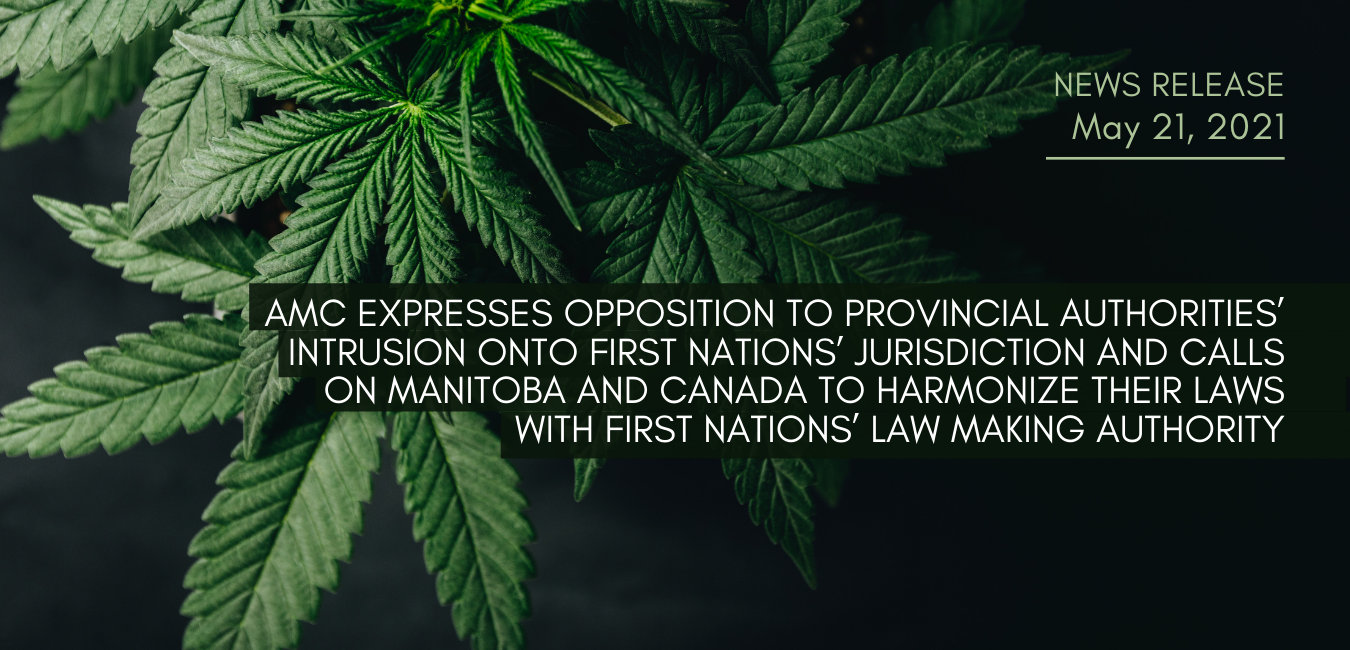AMC expresses opposition to provincial authorities’ intrusion onto First Nations’ jurisdiction and calls on Manitoba and Canada to harmonize their laws with First Nations’ law making authority

May 21, 2021
Treaty One Territory, Manitoba
alexpapineau
Treaty One Territory, Manitoba – The Assembly of Manitoba Chiefs (AMC) issues this statement in support of the Long Plain First Nation assertion and exercise of its inherent law-making authority with respect to its right to exclusively govern cannabis-related activities on reserve. Accordingly, the AMC expresses its strong opposition to Manitoba Liquor and Lotteries suspension of its retailer agreement with NAC Long Plain Limited Partnership for the Meta Cannabis Supply Co. store located at 420 Madison Street on Long Plain First Nation’s urban reserve in Winnipeg. This resulted in the immediate suspension of the store’s license by the Liquor, Gaming and Cannabis Authority of Manitoba (LGCA). On May 19th, LGCA inspectors suspended the license of the cannabis store and assumed control of the product on reserve lands.
Grand Chief Arlen Dumas stated, “The intrusion of provincial authorities onto reserve lands and the closing of the Madison Street store is a violation of the Long Plain First Nation right and exclusive authority over economic development activities. The suspension of the license of the Madison store is in retaliation to Long Plain First Nation’s decision to enact the Long Plain First Nation Cannabis Law in order to get out from under the Provincial cannabis monopoly and operate its own cannabis supply chain on its Keeshkeemaquah reserve located on Treaty One territory adjacent to Portage La Prairie. The Madison street store is not itself in violation of any provincial regulations.”
Grand Chief Dumas added, “Long Plain First Nation’s Cannabis Law secures and preserves the health and safety of its members and any patrons visiting its reserves. The standards adopted by the Long Plain First Nation meet or exceed health and safety standards established under Federal and Provincial laws.”
“I strongly condemn this illegal intrusion onto reserve lands and the heavy-handed approach to stifling the Long Plain First Nation’s economic success with respect to its cannabis ventures,” said Grand Chief Dumas. “First Nations in Manitoba have the right to enact their own laws and regulatory mechanisms for the production and sale of cannabis on reserve. Although they have the right under international standards on the inherent right to self-determination to enact their own laws with respect to cannabis, First Nations have not to date fully exercised this right and have continued to work cooperatively with Manitoba Liquor and Lotteries and LGCA to ensure First Nations’ participation in the cannabis market.”
“First Nations do not want to continue to be subject to an unfair monopoly where a cannabis license is issued only if the licensee agrees to buy cannabis from Manitoba Liquor and Lotteries and the LGCA as the sole supplier,” continued Grand Chief Dumas. “What the Provincial government is doing is predatory; and it is penalizing a First Nation for pursuing economic empowerment. The Federal government also bears some responsibility for this through its failure to consult First Nations on the Cannabis Act, which came into force in October 2018.”
“The AMC stands with Chief Dennis Meeches and the Long Plain First Nation in refusing to no longer be subject to the Provincial cannabis monopoly, in enacting their own cannabis laws and in exercising their right to self-determination. I also call on the Federal government to amend its Cannabis Act and other regulatory regimes, to consult with First Nations on a review on cannabis legislation and to recognize First Nations’ law making ability with respect to the Cannabis Act. To prevent future infringement on the rights of the Long Plain First Nation, and all First Nations in Manitoba, the Province of Manitoba must harmonize Sections 91 and 92 of the Constitution Act, 1867 with First Nations’ laws and their right to self-determination not only for the cannabis industry but for all sectors of the economy as well,” concluded Grand Chief Dumas.